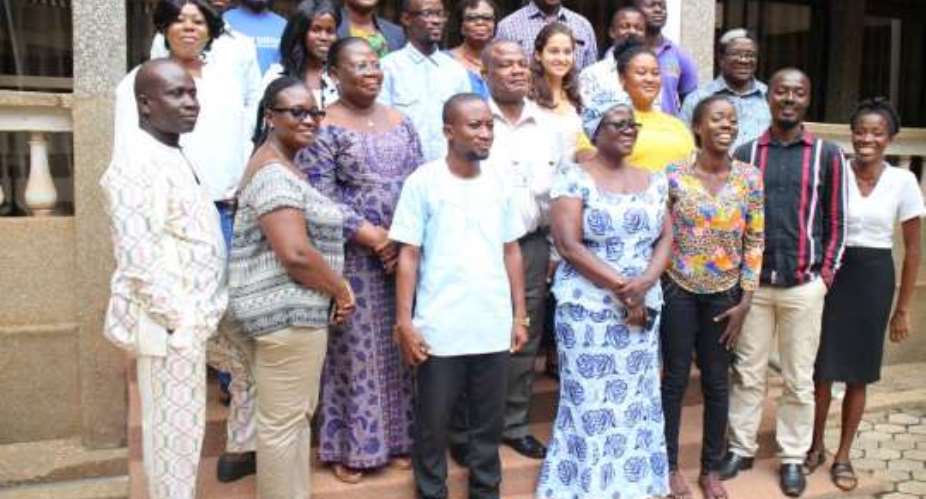Tamale, July 22, GNA - Mrs Yaa Oforiwaa Asare-Peasah, the Director of Editorial, Ghana News Agency (GNA), has called on journalists to use their media platforms to educate citizens on their health rights and ensure that government performed its role effectively.
She said this would help reduce the inequality in health service delivery at both the district and national levels.
Mrs Asare-Peasah made the call at a two-day workshop for GNA regional correspondents and members of the Media Communication and Advocacy Network (MCAN) on the People for Health project (P4H) in Tamale.
The P4H is a five-year project - March 2016 to March 2021- funded by the United States Agency for International Development (USAID).
The project is being implemented in 20 districts of four regions to ensure improved access to quality health service delivery.
It seeks to strengthen organisational and institutional capacities of government and civil society organisations (CSOs) for mutual accountability in health, HIV, water, sanitation and hygiene, family planning and nutrition policy formulation and implementation.
A consortium of three organisations is implementing the project in the Greater Accra, Eastern, Northern and Volta regions led by SEND-Ghana, a non-governmental organisation (NGO) with Penplusbytes, an NGO, and the Ghana News Agency as partners.
Mrs Asare-Peasah said although Ghana had improved in the provision of health services some areas in the country had not attained the expected results leading to high maternal mortality, HIV/AIDS infections and malaria among others which remained a challenge.
She, however, pledged GNA's support in ensuring that the project was successfully implemented and help to increase citizens' voice to demand for improved access to quality health services.
Madam Aisha Mohammed, the Planning, Monitoring and Evaluation Officer of SEND-Ghana, said the project sought to leverage opportunities for change, build on consortium members' good relations with local governments and district health management teams and USAID's initiatives in the health sector.
She said: 'The consortium's emphasis on social accountability will increase CSO leadership, mobilise communities and key populations to demand quality delivery of health programmes, promote accountability in the use of health resources and simultaneously maximise the responsiveness of health service providers.'
The project, she noted, would improve inclusiveness and equity and make the country a model for health systems which served the people according to their needs
She expressed worry about late referral, poorly equipped health infrastructure, and pregnancy disorders among other things, which contributed to high mortality and said those must be addressed.
Madam Mohammed noted that poor attitude of health professionals also contributed to some patients being maltreated and their rights abused.
She said discrimination and stigmatisation against vulnerable groups including Key Populations (prostitutes, gays and lesbians), women and youth, the weak capacity of CSOs and Community Based Organisations (CBOs) to demand accountability for quality service delivery, and lack of awareness on Patients' Rights contributed to abuse of rights of patients.
Ms Mohammed explained that weak policies and socio-cultural practices were barriers that prevented vulnerable groups such as the KPs from accessing healthcare.
She called on CSOs and CBOs to demand accountability for quality service delivery, create awareness on Patients' Rights and Code of Ethics to prevent their rights from being abused.
'If civil society is strengthened in a way that increases citizen input into Ghana's health and HIV development process, Ghana's health system will be more participatory and responsive to the needs of the beneficiary population.
'And our interventions will work towards achieving USAID goal of Equitable Improvements in Health Status,' she said.
GNA
By Rashid Mbugri, Frederica Kyeremanteng, Naa Shormei Odonkor, Rose Wayo, GNA





 2024 elections: Resign if you can't be faithful to party - Sagnarigu NDC PC desc...
2024 elections: Resign if you can't be faithful to party - Sagnarigu NDC PC desc...
 Five arrested, remanded over alleged murder of two police officers at Transacco
Five arrested, remanded over alleged murder of two police officers at Transacco
 Tax exemptions better than incentives for churches – Tax Analyst tell Bawumia
Tax exemptions better than incentives for churches – Tax Analyst tell Bawumia
 Transport Minister sues Law Platform Editor for defamation
Transport Minister sues Law Platform Editor for defamation
 Voter registration: Police arrest NPP Treasurer for Mpohor for registering minor
Voter registration: Police arrest NPP Treasurer for Mpohor for registering minor
 "This nonsense must stop" — Lawrence Tetteh vows to march to Jubilee House over ...
"This nonsense must stop" — Lawrence Tetteh vows to march to Jubilee House over ...
 2024 elections: “If indeed you stand for peaceful elections the time is now for ...
2024 elections: “If indeed you stand for peaceful elections the time is now for ...
 I have the attributes to be president of this country — Bernard Monarh
I have the attributes to be president of this country — Bernard Monarh
 Cecilia Dapaah saga: ‘Turf war’ between AG, EOCO, OSP indicates they’re not ‘cor...
Cecilia Dapaah saga: ‘Turf war’ between AG, EOCO, OSP indicates they’re not ‘cor...
 Ghana will become the first African country to embrace blockchain-powered gover...
Ghana will become the first African country to embrace blockchain-powered gover...
